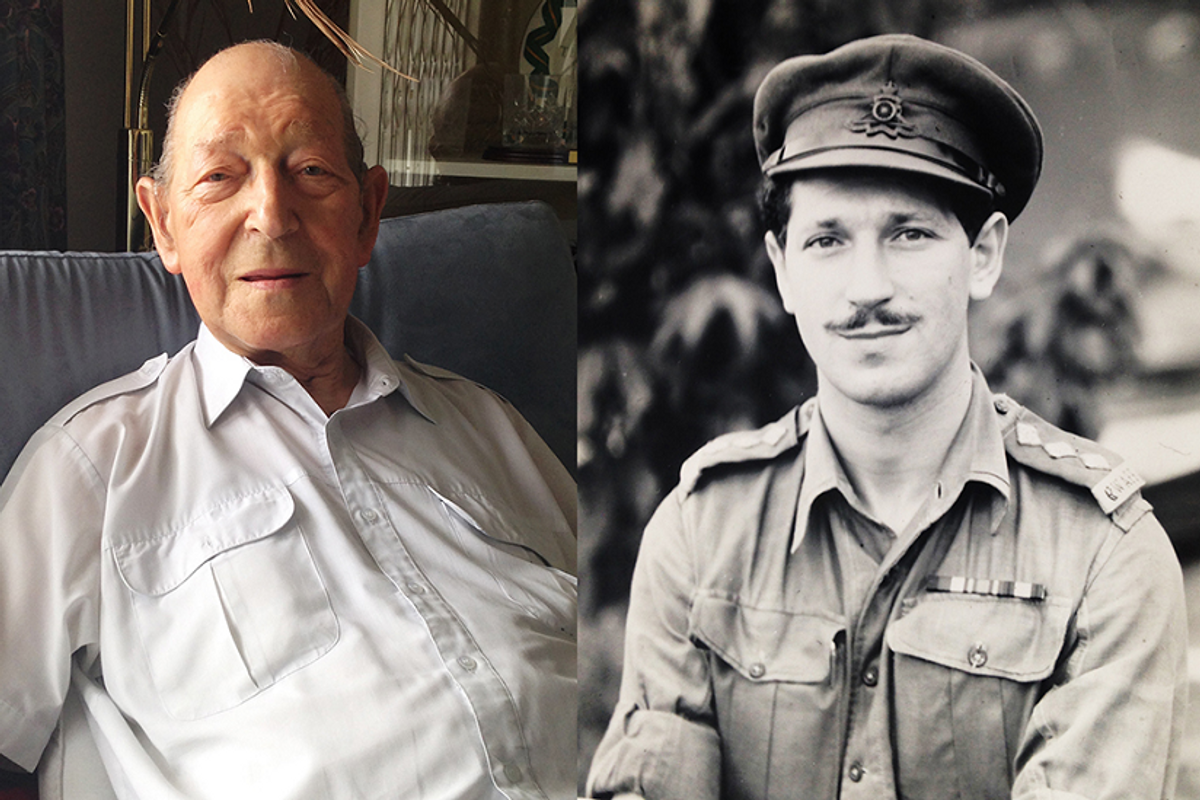
On August 15, 1945, when the Japanese Emperor Hirohito surrendered in a pre-recorded radio address to end World War II, British officer Mordaunt Cohen was in Burma, where he had fought with a unit of soldiers from West Africa.
In the jungle, information about the broader theater of war was scant. But when news of the radio address came, Cohen and a brigadier celebrated by drinking an old bottle of Brandy that had, like them, somehow survived the fighting.
As the 70th anniversary of the end of World War II approached last month, stories about “Burma campaign” veterans surfaced weekly. Cohen’s caught my eye for several reasons.
He was a British Jew in a position of some authority within the British war effort, which struck me as rare for the time. He had fought in Burma, one of the least remembered battlefields of World War II, alongside West African soldiers, whose contributions are some of the least remembered. He was also fighting side-by-side with members of another faith. The Nigerians in his unit were mostly Muslims.
The story starts in 1940 when Cohen enlisted from his home in Sunderland, a city in northeast England. His goals were twofold, to serve his country and “his people.”
“It was what I wanted,” he said in an interview with the Jewish Chronicle Online in August. “I felt I had to do my job as a Jew.”
“We had a Jewish refugee’s hostel for girls near us, so we knew what was happening in Germany. I would see them being brought over on the Kindertransport and I couldn’t ignore it.”
But Cohen didn’t go to Germany or liberate concentration camps. He was sent to Nigeria in 1942 to command a unit that was part of the Royal West African Frontier Force. A year later, Cohen and company began the journey from India to Burma, now known as Myanmar, to fight occupying Japanese forces.
When we think of “non-white” soldiers fighting in World War II, Indians and Nepali Gurkhas loom large, and for good reason. But nearly 100,000 West Africans went to Burma. They were from all over: Nigeria, Ghana and Sierra Leone. Many were teenagers, a fact captured in the title of the popular 2007 novel “Burma Boy” by Biyi Bandele.
“My unit was Two Five One West African Heavy Anti-Aircraft Regiment,” Cohen was quoted as saying in the Chronicle. “Eighty percent were Muslims and there was I, a Jewish officer, and there was no problem at all.”
Cohen said the Nigerians, who made up the bulk of the fighters, called him “the white Muslim.”
The Japanese started moving on Burma in 1941. The advance was rapid. They occupied Rangoon and moved north, bombing along the way. Cohen was involved in a brutal six-month campaign to recapture Arakan, or Rakhine state, in western Myanmar, where tropical diseases flourished.
During Cohen’s service, connection to the outside world was almost non-existent, and he and others felt forgotten.
“We were out in the bush, we didn’t have radio, we didn’t have TV, we didn’t have newspapers,” he told England’s Forces TV, which covers the military. “We didn’t really know what was going on.”
After the war, Cohen stayed in the military for several years and was active in veterans affairs, becoming Vice-President of the Association of Jewish Ex-Servicemen and Women in England. Today he lives in Edgware, a neighborhood in London.
Because of his age and his military career, he is very hard of hearing, and a phone interview I arranged through the Ministry of Defense went poorly: “He worked on artillery during the war,” a spokeswoman told me over email. “And now that he’s in his hundredth year, he’s feeling the effects of all those big bangs.”
VJ Day is commemorated in England on August 15. Despite his old age, Cohen reportedly marched in annual parades until last year. This anniversary will be a more private affair, he told the Chronicle.
Cohen said he would sip from a large glass of whiskey and “think about how I felt at the time, which was: ‘Wonderful! This is the end.’”
Joe Freeman is a Southeast Asia-based journalist whose work has appeared in The Washington Post, Foreign Policy, The Guardian, The Christian Science Monitor, The Phnom Penh Post, and the Nikkei Asian Review.